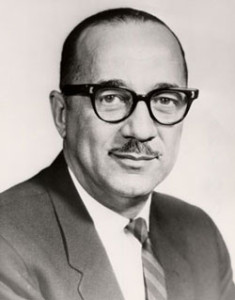William Hastie had one of the most distinguished careers as an earlier Black political pioneer but today remains unknown to most Americans. As a politician, an educator and a jurist, Hastie made inroads and left a legacy that is hard to match in history.
William Hastie was born on November 17, 1904 in Knoxville, Tennessee, the son of William, a clerk in the United States Pension Office and Roberta, a school teacher. After the family moved to Washington D.C. in 1916, William attended Paul Lawrence Dunbar high school where he excelled as a student athlete and graduated as the school valedictorian in 1921. He attended Amherst College in Amherst, Massachusetts where he majored i mathematics. He graduated from the school in 1925 where he finished first in his class and graduated Phi Beta Kappa, Magna Cum Laude and the valedictorian of his class. After teaching for two years in Brodertown, New Jersey, he attended Harvard Law School where he was a member of the law review and graduated with an LL.B. in 1930.
After passing the bar exam in 1930 he joined the law firm of Charles Hamilton Houston, Houston, who ran his law firm along with his father William, was also the Dean of Howard University Law School. In addition to becoming a partner in the firm (the firm would become known as Houston, Houston and Hastie) Charles was able to persuade William to become a professor at Howard Law School. William taught at the Law School until 1946 and one of his first students was Thurgood Marshall (a future Supreme Court Justice).
Hastie was one of the founding members of the Washington, DC chapter of the New Negro Alliance. The Alliance believed in the motto “Don’t buy where you can’t work.� One of his first prominent cases was New Negro Alliance v. Sanitary Grocery Co.. A local court has issued an injunction against Blacks who were picketing against chains stores in Black communities which only hired white employees.
Although Hastie lost in a lower court and an Appeals Court ruling, the case eventually went to the U.S. Supreme Court where it was overturned. While Hastie did not argue the case in front of the Supreme Court, the case was important because it established that the Norris-LaGuardia Act barred injunctions against peaceful labor-related picketing. The experience also broad him into prominence as a civil rights advocate.
In 1933 he was approached by Harold Ickes, the Secretary of the Interior under President Franklin Roosevelt and appointed Assistant Solicitor. In this capacity he advised the federal government on racial matters and was asked to draft legislation related to the U.S. Virgin Islands. The Organic Act of 1936 established a fully elective legislature and allowed for residents to vote regardless of their property, income, or gender. Subsequently he was appointed by President Roosevelt as District Judge in the Virgin Islands making him the first Black Federal judge. Although the appointment was for a four year term, Hastie resigned to take over as the Dean of Howard Law School in 1939.
A year later he stepped down from his position with the law school in order to accept a position as a civilian aid to the Secretary of War, Henry Stimson. Hastie was brought in to help in advising on ways to eliminate desegregation within the armed forces, especially within the Army Air Force. Despite his efforts, segregation was still being employed in training facilities and there was a prevailing inequality in the assignments given to Black and white servicemen. As a result, he resigned his position and returned to Howard Law School. For his contributions to civil rights issues and in part to his stepping down from the War Department in protest, he was awarded the Spingarn Medal from the NAACP in 1943.
Hastie fought against racism in major Federal lawsuits. In two of these lawsuits he worked with his former student Thurgood Marshall and with the NAACP. In Smith v. Allwright they argued against the white Democratic primary and in Morgan v. Virginia against segregated interstate transportation. Their team was victorious in arguing both cases before the United States Supreme Court.
William Hastie – Great Black HeroesIn 1946 he was nominated by President Harry S. Truman to serve as the Governor of the Virgin Islands and he became the first Black Governor of any United States territory (P. B. S. Pinchback had served for only one month as acting governor of Louisiana during Reconstruction). In 1949, Truman once again called upon him and he was appointed to the U.S. Court of Appeals, Third Circuit and he served in this capacity until 1968, whereupon he ascended to the position of Chief Judge until he retired in 1968. President Kennedy had considered appointing him to the U. S. Supreme Court but worried that he would not be able to get him confirmed with the racial climate at the time and the power of the Dixiecrats in Congress.
When William Hastie died on April 14, 1976 in Norristown, Pennsylvania, he left behind a sterling and remarkable legacy as a student, an educator, a politician and a jurist. He laid down footsteps for generations of Black public servants to follow in.
